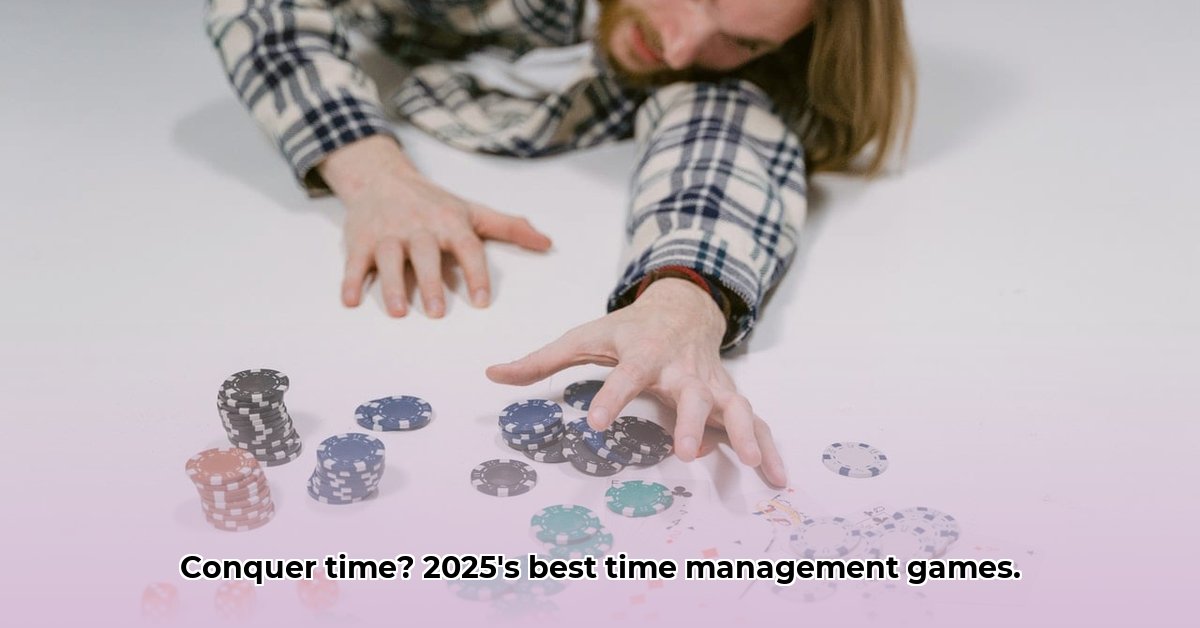Ever feel like you’re racing against the clock? Time management games are all about that rush – juggling tasks, making tough choices, and building something amazing under pressure. This article isn’t just about playing these games; it’s about winning them. We’ll dive into the history of these games, break down the different types (from restaurant empires to farming frenzies!), and give you the inside scoop on how to become a master strategist. Get ready to level up your skills, whether you’re a seasoned pro or just starting out. We’ll cover everything from simple tips to advanced tactics, plus a peek into what the future holds for these addictive and surprisingly helpful games. So, grab your mouse and let’s get started!
Exploring Efficient Time Management Game Play Styles
Conquering time, one click at a time – that’s the thrill of time management games! These aren’t your grandma’s solitaire games; they’re fast-paced, strategic challenges that blend puzzle-solving with resource management, offering endless replayability and a surprising amount of depth. Let’s dive into the world of efficiently clicking our way to success and learn about game play styles.
History of Enhanced Productivity Through Time Management Games
The history of time management games is, itself, a testament to efficient gameplay! While pinpointing the very first title is tricky, games like the classic arcade hit Tapper (1983) definitely laid the groundwork. Imagine the simple joy of pouring drinks – and the frantic challenge of keeping up with demand! From these humble beginnings, the genre has exploded. We’ve gone from serving beverages to managing entire restaurant chains, building sprawling farms, and even crafting bustling cities! This evolution mirrors the advancements in technology, proving that even simple concepts can create intensely engaging gaming experiences – which can improve players productivity.
Core Mechanics of Efficient Processes and Task Prioritization
The magic of time management games lies in the delicate balance of multitasking and resource allocation. It’s all about juggling multiple responsibilities – customers, crops, construction projects – and making the most of each precious second. Some games let you pause and plan your moves (turn-based), while others throw you right into the action with no time for second-guessing (real-time). The key is efficient resource management. Whether it’s serving customers, harvesting crops or managing building materials, smart choices are critical for success. Do you thrive under pressure or prefer a more strategic approach? Either way, you’ll find a time management game that suits you. Mastering these core mechanics translates to improved real-world efficiency, fostering better decision-making under pressure.
Deep Dive into Diverse Subgenres and Resource Management
The beauty of this genre is its incredible diversity! There’s a time management game out there for everyone. Let’s explore some of the most popular categories:
- Restaurant Management: Ever dreamed of owning your own eatery? Games like Diner Dash and Cooking Mama put you in charge. You’ll hire staff, handle orders, and keep your customers happy – all while the clock ticks relentlessly. It’s a whirlwind of managing orders, keeping staff motivated, and making sure everyone leaves with a smile (and a full stomach!). Simulating real-world scenarios like inventory management and customer service, these games provide a hands-on learning experience for aspiring entrepreneurs or efficiency enthusiasts.
- Farm Simulations: Trade the hustle and bustle of the city for the peaceful (but equally demanding!) life of a farmer. These games combine strategic planning with a touch of rural charm. You’ll plant seeds, raise livestock, and expand your farm, constantly juggling resources and meeting deadlines. It’s a surprisingly relaxing way to test your organizational skills. Many titles such as Farm Frenzy require forward-thinking to maximize profits, teaching players the importance of planning and adapting to unpredictable events like droughts or market fluctuations.
- City Building: Have a knack for urban planning? In these games, you design and develop thriving cities from the ground up. You’ll manage construction projects, allocate resources, and keep your citizens happy. It’s a long-term strategy game that requires careful foresight and efficient resource management. Facing complex challenges such as traffic congestion, budget constraints, and citizen satisfaction, these games will encourage innovative problem-solving to achieve sustainable progress.
- Hotel Tycoons: Ready to build a luxury hotel empire? These games challenge you to manage everything from guest satisfaction to staff training and facility upgrades. Balancing guest needs and managing finances is key to success. It’s a test of your ability to anticipate problems and keep your guests happy. Handling unexpected events such as celebrity visits or facility malfunctions will boost adaptability and quick decision-making skills.
Time Management Strategies for Success and Task Management Tips
Ready to conquer the clock? Here’s how to become a time management master in any game:
- Prioritize Intelligently: Don’t waste precious seconds on small tasks when bigger problems need attention. Focus your energy on the most critical actions, identifying bottlenecks, and allocating resources accordingly.
- Multitask Masterfully: Learn the art of juggling multiple actions simultaneously. Smooth transitions and efficient workflows are crucial. Develop a system for tracking multiple tasks to avoid bottlenecks and maximize your throughput.
- Invest Wisely: Upgrade strategically. Focus on improvements that yield the highest return on investment. Don’t waste your hard-earned cash! Evaluate the long-term costs and benefits of each investment to ensure sustainable growth and maximize profits.
- Automate When Possible: Streamline your workflow by automating repetitive tasks. This frees you up to focus on the more complex challenges. Investing in automation upgrades increases your output and reduces errors, giving you a competitive edge.
- Delegate Effectively: Assign tasks to workers strategically and optimize their routines. Delegate smaller items to focus on high-level planning.
Innovation and Future Trends in Gaming and Enhanced Productivity
The future of time management games is brimming with exciting possibilities! Expect to see more sophisticated AI that creates dynamic challenges, keeping you on your toes. Adaptive difficulty levels, personalized learning paths, and real-time performance feedback will offer a tailored gameplay experience. Virtual and augmented reality (VR/AR) may also reshape how we interact with these games, pulling us right into the action. Imagine constructing a virtual restaurant kitchen or managing a digital farm using hand motions! New monetization models, like subscriptions and carefully designed in-app purchases, might influence the industry. The future looks fast-paced and full of innovation!
Subgenre Comparison Table
| Subgenre | Primary Focus | Main Hurdles | Ultimate Goal | Key Skills Developed |
|---|---|---|---|---|
| Restaurant Management | Customer satisfaction, efficient service | Happy customers, smooth operations | Profitable restaurant, expansion | Prioritization, delegation, multitasking |
| Farm Simulations | Crop yields, livestock management | Resource allocation, timely harvests | Thriving farm, abundant harvests | Planning, adaptation, resource management |
| City Building | Urban development, citizen happiness | Resource management, city growth | Thriving metropolis, happy citizens | Strategic foresight, problem-solving, decision-making |
| Hotel Tycoons | Guest comfort, financial success | Meeting guest needs, managing expenses | Luxury hotel empire, high occupancy rates | Customer service, financial acumen, problem-solving |
Remember: These games are meant to be fun, so don’t be afraid to experiment and find what works best for you! The most important strategy is to enjoy the process. Happy gaming!
Applying Time Management Games to Improve Real-World Time Management
Key Takeaways:
- Time management games offer engaging, alternative training to traditional methods.
- Success depends on thoughtful game selection and post-game reflection.
- Future trends include personalized, AI-driven, and VR/AR-enhanced training.
Brief History of Time Management Gaming and Skill Development
Time management games have a surprisingly rich history. Early examples were simple, often focusing on a single task, like serving customers in a diner. Think Tapper and Diner Dash—classics that popularized the genre. Today, games offer far more complexity—multitasking, resource scarcity, and intricate planning are all key ingredients. Examples include the Tropico series or the Anno series. They’ve evolved from basic single-task simulations to sprawling digital empires. This evolution reflects our growing understanding of human behavior and the psychology of productivity.
Understanding the Game Mechanics and Strategic Decision Making
What makes these games tick? It’s the carefully crafted loop of challenges. Players receive objectives, manage limited resources (time, money, staff), and strategize for success. The reward? That satisfying sense of accomplishment from overcoming obstacles. How to improve real-world time management using time management games lies in understanding these mechanics. Successfully navigating resource constraints and pressure translates seamlessly into real-world scenarios.
Selecting the Right Tool: Different Game Types and Skill Enhancement
The genre is incredibly diverse. Consider these variations:
- Restaurant Simulators: Overcooked! and its sequels stand out. These games teach the value of teamwork and coordination under pressure. Mastering this frantic environment mirrors real-world teamwork on fast-paced projects.
- Farm Games: Farm Frenzy and similar titles present a different challenge—managing harvest cycles, production, and sales within time constraints. Successfully overseeing these complex processes develops strategic thinking and forward-planning abilities.
- City Builders: Cities: Skylines or SimCity games often require long
- Top Rated Meditation Books to Deepen Your Practice - February 5, 2026
- Good Mindfulness Books For A Calmer, Happier Everyday Life - February 4, 2026
- Recommended Meditation Books for Beginners and Experienced Practitioners - February 3, 2026
















